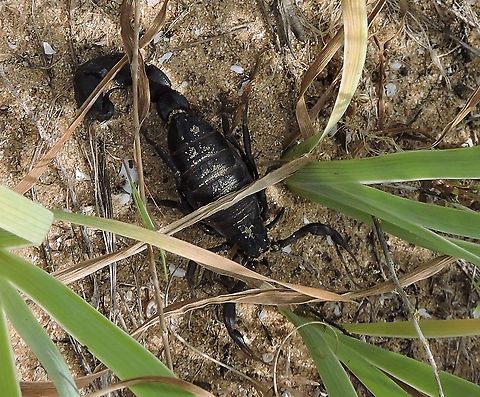
Appearance
Black fat-tailed scorpions come from the family Buthidae, which is the largest of the scorpion family. They can be identified by their hefty physique. They tend to move very fast, and are of an aggressive nature. Black fat–tailed scorpions can live for up to 5 years. Adults can reach up to 40-60 millimeters, 80 millimeters being the maximum. These scorpions typically possess black and brown coloration.Habitat
These scorpions enjoy making scrapes with wood and rocks, and are nocturnal, thus they hide in crevices or certain objects during the day. They stay in shade to retain moisture in their bodies, as they are susceptible to losing moisture due to their environmental preference.Defense
Black fat–tailed scorpions use neurotoxic venom, which is fast acting and can be absorbed very quickly, because of the small molecular weight of the proteins that make up the venom. These neurotoxins act on the central nervous system, causing paralysis in the nerves that are responsible for respiration, which ultimately causes death by respiratory failure.The neurotoxins may also cause widespread neuronal excitation, symptoms of which can include pain, sweating, salivation, and tearing. Severe envenomation is likely, as the rate of envenoming is 10-20%, making it potentially lethal. Victims are likely to feel progressively weaker after envenoming. Envenoming can result in death, which can occur between 5 and 15 hours, but it is also possible for death to occur within one hour.
Examples of common symptoms that occur after a sting are: drowsiness, drooping eyelids, paralysis of neck muscles, loss of muscle coordination, and abdominal pain. A monovalent antivenom called Anti-scorpionique is available to treat stings from a black fat-tailed scorpion.
References:
Some text fragments are auto parsed from Wikipedia.